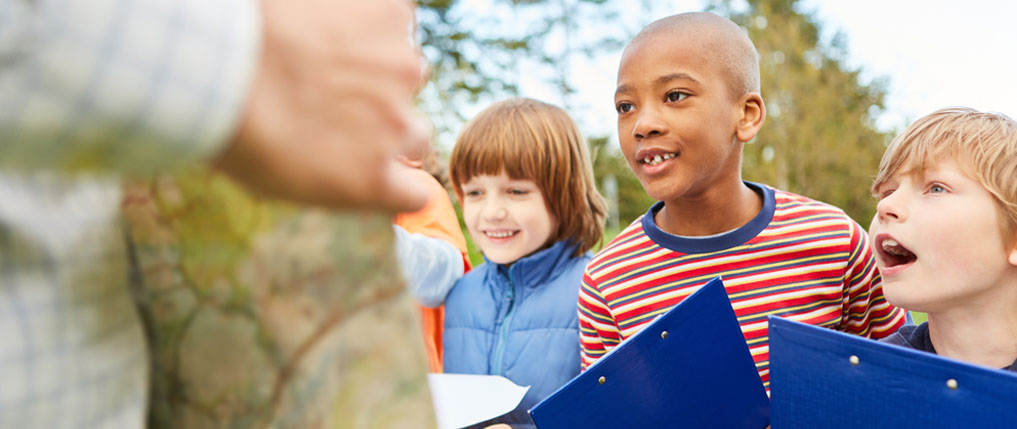How to Plan a Camping Scavenger Hunt for Kids
June 5, 2021

Looking for a fun activity to entertain the kids while camping? Try a scavenger hunt! Whether you look for items as you go hiking with the kids or to keep them occupied at the site while you cook dinner, use these handy tips and ideas to make your scavenger hunt a fun outdoor activity the whole family can enjoy.
Learn how to plan a camping scavenger hunt for kids to keep everyone free of boredom and with a newfound appreciation of nature.
Scavenger Hunt Basics
When planning a camping scavenger hunt, you can start with the basics and incorporate your nature-themed list of items. On a typical hunt, you can choose to spread out pre-chosen objects or use objects already available within your surroundings.
However, avoid items that could potentially get lost or left in the woods. Instead, choose a scavenger hunt that is either items from the forest, site and campground or an experiential hunt list with activities to complete. (It doesn’t always have to be found objects!) And remember to make the game last the entire weekend or even into the night so they can learn to use their LED flashlight for hunting for nocturnal creatures or just enjoying gazing at the stars.
Generally, scavenger hunts can be played as a friendly one-on-one competition or divided up into teams. However, it would be wise to create groups or at least pairs for hunting at a campsite or campground so kids can stick together. Pairing responsible older kids (or an adult) with little ones is a good idea, too. This way, the eldest can carry a backpack with the Ten Essentials just for safety measures.
Create a prize for whoever finds the most items on the scavenger hunt list. It could be as simple as a treat or even a small camp-themed plush animal like a bear or squirrel.
Speaking of which, just what kinds of items should you put on your list? We’ve gathered a fun collection of ideas below.
Camping Scavenger Hunt ideas

Need to come up with ideas for your camping scavenger hunt? Look no further. We have you covered!
Scavenger Hunt Items
When creating lists, there are several imaginative ways you can present them. Whether you choose to create an alphabetized list for a teachable lesson or create a list using clues, it’s entirely up to you. But here is a collection of fun items that kids can seek out, exploring the landscape and surrounding nature.
- Specific leaves and vines of trees and bushes
- Fungus, moss or lichen on a tree
- Animals or their tracks: Deer, bunny, etc.
- Bugs and insects such as ants, spiders, ladybugs, beetles
- Butterflies, moths, caterpillars and cocoons
- Worms, slugs and snails
- Squirrels or chipmunks
- Birds, bird nests or their feathers
- Reptiles and amphibians like lizards, geckos and frogs
- Wildflowers, berries and tree blooms
- Seeds, pods, acorns and pine cones
- Poison ivy (to teach kids how to identify and avoid!)
- Water sources such as streams, creeks and ponds
- Grasses, clovers and ferns
- Earth elements such as rocks, pebbles, minerals, sand, soil and mud
Experiential Scavenger Hunt Activities
As mentioned, your list doesn’t have to be items. It could also be activities that kids cross off over the entire span of a weekend. Not sure what we mean? Here are a few kid-friendly ideas to get you started:
- Draw a picture of a tree, animal or flower
- Do a leaf rubbing
- Identify leaves and trees
- Catch a fish (or a specific kind of fish!)
- Skip a stone across a pond
- Listen to a bird sing
- Hear the wind in a tree
- Feel the bark of a tree
- Touch a mossy rock
- Smell a pine tree
- Find and smell flowers
- Watch a sunrise or sunset
- Catch (and release!) bugs
- Identify trail markers
- Spot a fish jumping in a pond
- Find a funny shape in the clouds
- Spot a shooting star
- Find a spider making a web
- Watch an animal eating
Some activities, like catching fish, take lots of patience. So if you plan to be out for a while, make sure to pack lunch and drinks in a personal cooler.
Teaching Kids to Respect Nature
One of the most important benefits of a camping scavenger hunt is teaching kids to respect nature. Remind them as they hunt for the items or enjoy the experience that they should let nature be. Teaching your kids the 7 Leave No Trace principles encourages them to stay away from animals and leave flowers unpicked. The ecology of the forest or environment they are scavenging can be delicate, and instilling these values early can last a lifetime.

SIGN UP FOR EXCLUSIVE OFFERS
Sign up for our newsletter and get exclusive access to new product launches, special offers and much more.
RELATED BLOGS














